... neuere Einträge
Dienstag, 10. Februar 2009
Am Dienstag, 10. Feb 2009 im Topic 'Empire'
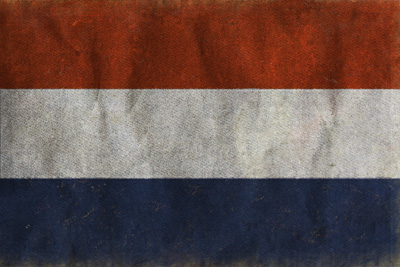
The United Provinces are a Protestant stronghold in North-western Europe, a place where science, trade and freedom of thought have flourished since the Spanish were driven out in the last century. Having tamed their land and held back the sea, the Dutch have also embraced the sea and become the foremost naval power in the world. A mere generation ago, the Dutch navy sailed into the Thames and burned the English fleet at anchor: this kind of bravado and expertise is not quickly forgotten.
Dutch merchantmen range across the world’s oceans, and the wealth of the world passes through Dutch ports. Dutchmen can be found trading in the Indies, where they give the locals a run for their money, and the Caribbean. They are everywhere, in fact, where there is a profit to be made. Spanish claims to the New World and its trade are cheerfully ignored, as are Spanish threats. The Dutch have learned to live with Hapsburg threats hanging over their heads. Having beaten off brutal attempts to bring them to heel, the Dutch now have little love for Hapsburg-ruled Spain or Austria. A distant Catholic emperor holds no appeal for them. An expansionist France, on the other hand, does bear watching, and guarding against.
Other rivals close at hand are now less of a threat than they used to be. The British have been… tamed is too strong a word… brought to their senses by having a good, honest Dutchman on their throne. William III of Orange was an acceptable Protestant ruler for the British when they needed one. His presence has done much to calm relations, especially as the equally-mercantile British have designs on world trade that should rightfully be Dutch!
For the future, the Dutch have much to be hopeful about. They have a strong navy, and a tradition of victory. There is wealth aplenty in every corner of the world, if only the Dutch have the will to go and take it!
Permalink (0 Kommentare) Kommentieren
Am Dienstag, 10. Feb 2009 im Topic 'Empire'
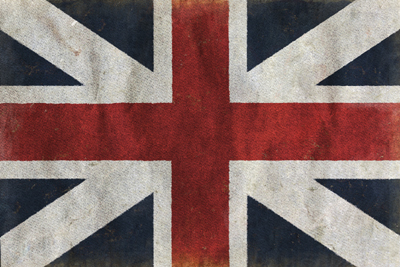
Great Britain is not a natural creation, but the marriage of separate kingdoms and peoples. The new nation has been through a century of unparalleled turbulence: an unwelcome joining of Scotland and England; religious strife; civil wars; an executed king; military dictatorship; a populist monarch restored; and the overthrow of a second king. Less than 15 years ago, the hated Catholic James II was forced into exile in the Glorious Revolution and a Protestant monarchy restored. A short, vicious war in Ireland put paid to any chance of a Catholic Stuart restoration. Nonetheless, the exiled James Stuart has sympathisers, the Jacobites, throughout Britain. Despite – or perhaps because of – this turbulent history, Britain is an engine driving the scientific and cultural advancement of northern Europe: turmoil fuels creativity.
As an island nation, Britons have always looked to, as Shakespeare puts it:
“…the silver sea, Which serves it in the office of a wall, as a moat defensive to a house…”
Britain’s strength lies at sea, but in trade and colonisation as much as naval power. Trade taxes pay for the navy; the navy allows unhindered trade. The English Channel keeps the French at bay and, to a lesser extent, the Dutch. With Dutchman William III on the British throne, there is ambivalence in the traditional rivalry with the Netherlands!
The English and Scots like to think that they can sleep safe, that no foreign invader or tyranny need worry them. They are partly right, but only as long as there is no centralised Continental power. A nation that can unite the resources of Europe will surely crush the dream of Albion. This, then, is the fundamental aim of Britain: to side with the weak in Europe against the strong – and steal as many overseas possessions as possible while doing it!
Permalink (0 Kommentare) Kommentieren
Am Dienstag, 10. Feb 2009 im Topic 'Empire'
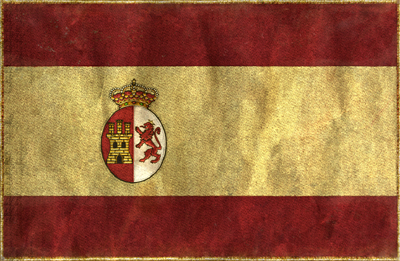
The Spanish have a long been conquerors and colonisers in distant parts. Indeed, the Spanish and Portuguese signed a treaty in 1494 that neatly divided the world between themselves. The Spanish went conquering “for God, Spain and to get rich”. They succeeded, to a great degree, in all three aims.
Spain is a staunchly Catholic country, and the Church and the fearsome Spanish Inquisition still have their hold over men’s hearts. This partly explains why, for all its wealth, Spain is economically backward: the Church sees usury (money lending) as sinful. This may be so, but this lack of credit does not help the merchant classes. Economic growth is also not helped when it is beneath the dignity of any hidalgo gentleman to earn money or work. But a gentleman’s honour is worth defending and a nation’s glory is worth winning, so courage is not in short supply. Indeed, Spain is blessed with courageous men on both land and sea.
That Spain will need defending, and soon, is self-evident to many. Charles II, “El Hechizado” or “the Bewitched” is a feeble-minded and pathetic figure, a shadow of his Hapsburg ancestors, and childless. Spain has suffered from his weakness of mind and government, but Charles cannot live forever. When he dies, what forces will shape the destiny of the Empire? Will Spain once again face its Protestant rivals down? Will new there be a new generation of conquistadores to plant the Spanish flag on distant shores? His successor will have much to ponder, but a brave nation to lead back to greatness!
Permalink (0 Kommentare) Kommentieren
Am Dienstag, 10. Feb 2009 im Topic 'Empire'
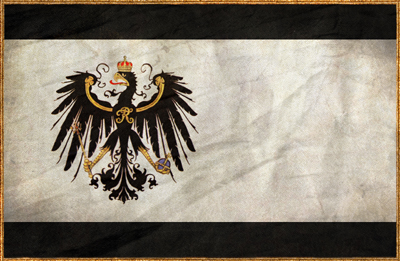
Prussia itself has only been “German” since the 13th Century, when the Teutonic Knights carved out a new Christian state on the Baltic coast. The present Kingdom of Prussia is a new state, the result of a union between the duchies of Brandenburg and Prussia, and it is a Kingdom only because the current ruler, Elector Frederick III has decided to improve his status to that of King! In doing so, however, he has been careful not to offend the Holy Roman Emperor, the Archduke of Austria, and calls himself the King “in” Prussia, not the King “of” Prussia. The form of words is a fig leaf: Frederick is King. And he is the king of a potentially powerful and influential Protestant nation, a centre of gravity within “the Germanies” for all those who would look elsewhere for a lead than Catholic Austria.
The Prussians believe – not without reason – that their virtues as a people can carry them through any trouble: martial discipline, sacrifice, a sense of order, but this sense of duty should not be confused with ignorance or intolerance, no matter what others may say. Prussians have always had to fight, but that has made them competent, not bloodthirsty. They have the potential to become a great continental power thanks to their martial traditions, many of which can be traced back to the Teutonic Knights. These could form the basis of a truly world-beating army. Under the right guidance, they could unite the German-speaking peoples into a single entity, dominate the Baltic and, perhaps, extend their reach far beyond the confines of Central Europe.
Permalink (0 Kommentare) Kommentieren
Am Dienstag, 10. Feb 2009 im Topic 'Empire'
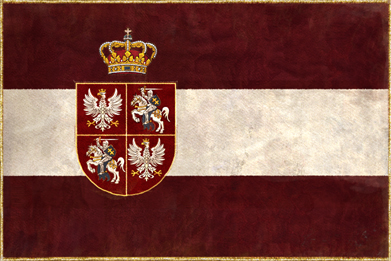
Poland is an old idea, and an old kingdom. Like anything old, it has old enmities and problems.
The problems, and enmities, are those of any state surrounded by ambitious rivals, all of whom are looking to become stronger at someone else’s expense. Sweden’s ambitions to create an empire around the Baltic; Tsar Peter’s desires to make Russia a great European power to rival the style of Bourbon France; the Austrians and Prussians each seeking to define a greater Germany and secure their borders; even the distant Ottomans have to be considered, should they ever launch a new assault on Christian Europe. And in the middle of all of this, a Polish-Lithuanian state that is not under the control of a single, strong ruler, a man who can impose his will to defend his people. Instead, Poland is something altogether stranger: a land where the people have a say in government.
That the country has survived at all is a tribute to the spirit of its people.
And yet, these rivalries could be turned to advantage. A Polish leader who picked his alliances carefully, and his wars equally so, could do much to make his country great. The Russians have no divine right to dominate the steppes, or the Swedes to control the Baltic. The various Germans states need allies, the same as other nations, and cannot expect to take anything they want without a struggle. A clever Polish leader could make much of this situation, if he can manage the hopes, expectations and fears of his people at home.
Permalink (0 Kommentare) Kommentieren
Am Dienstag, 10. Feb 2009 im Topic 'Empire'
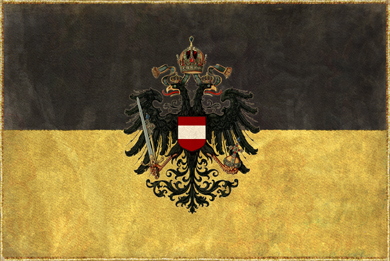
The history of Austria is one of warfare against invaders from the east, and the infidel Turks in particular. The originally Duchy was the eastern marches of the Holy Roman Empire (the Ostmark), and the defensive importance of Austria to the rest of Europe is immense. For nearly 250 years, the Ottoman Turks have hurled themselves against the bastion of Austria, reaching the gates of Vienna on more than one occasion. The last time was in 1683. Austrian bravery has kept them at bay, every time.
After the bloodletting of the last century – the Thirty Years War – within the Holy Roman Empire, Austria is a leading power among “the Germanies”. Leopold I, the ruling Hapsburg, has brought peace and prosperity, and maintained a first-class military machine (in particular, the Austrians have mastered the tactics using light, irregular troops). This gives the Austrians the potential to become a truly great power, either within the borders of the old Empire, to the south in Italy, or to the east. This latter scheme requires the Turks to be persuaded – at sword point – that their destiny lies outside Europe. The Austrians also have much to be proud of in the arts, music and culture.
Beyond their immediate borders, there are other matters for the Hapsburgs to consider. The Spanish branch of the family is now close to extinction, as Charles II has failed to produce an heir, among his other problems. Perhaps Spain should remain a part of Hapsburg domains, but this might lead to confrontation with France. And then, of course, there are the pan-Slavic, Christian Orthodox ambitions of the Russian Tsar to consider…
Permalink (0 Kommentare) Kommentieren
Empire: Total War - Sonderberichterstattung
Am Dienstag, 10. Feb 2009 im Topic 'Empire'
Tipps und Tricks
Fakten
(Stand 9.2.2009)
Fraktionsbeschreibungen
Videos
Ein Kampagnenbericht
(CA-Mann Jack Lusted berichtet von 42 Runden mit Schweden)
Road to Independence
Screenshots 1
Screenshots 2
Einheiten
(english)
STEAM F.A.Q
------------------------------------------------------
Facts von shogungtotalwar.yuku.com
Die Home Theatres
Indien (Karte und Fraktionen)
Die Karte in Screenshots
Die pragmatische Allianz
Die Regionen von Europa
Spekulationen
Strategie für Österreich
Strategie für das Osmanische Reich
Übersicht der Fraktionen
Ein unheiliges Bündnis
Montag, 9. Februar 2009
Die pragmatische Allianz - Frankreich und Spanien
Am Montag, 9. Feb 2009 im Topic 'Empire'
Vom ersten Zug an ist Europa in in einem Krieg gefangen, dem Spanischen Erbfolgekrieg. Nachdem es die Borbounen auf den spanischen Thron geschafft haben, versucht England mit einer Allianz aus Kleinstaaten und dem mächtigen Österreich Spanien die Besitzungen in Mitteleuropa wieder abzunehmen.
Andere mögen die Chance in Empire kooperativ zu zocken kreativ nutzen, diejenigen die nach einer möglichst todsicheren Allianz suchen, können jedoch leicht drauf verzichten und dennoch eine herausfordernde Schlachten erleben.
Spaniens Stellung ist zu anfang sehr stark, das muss so bleiben, es ist also notwendig sich an folgende 3 Punkte zu halten und Frankreich kann nur davon profitieren.
Aggression-Elimination
Als Antwort auf die Kriegserklärungen müssen Portugal, Savoyen und Niederlande ausgeschaltet werden. Portugal sollte Ziel einer französischen Flotte mit Truppen werden, Verstärkung kommt von spanischen Hilfstruppen. Savoyen sollte französisch werden, Truppen von Spanisch-Mailand, Italien und Frankreich. Die Niederlande müssen vollständig spanisch werden, französische Truppen aus dem Elsass. Friedensverhandlungen.
Damit sind 2 Kolonialmächte ausgeschaltet, sowie 2 Rivalen um die Vorherrschaft im Mittelmeer und insgesamt 3 potentiell aufstrebende Gegner an den Flanken.
Konsolidierung-Aufrüstung
Gebiete aufteilen (die ehemals portugiesichen Kolonien und eventuell besetzte Länder in Deutschland und Italien), Militärstützpunkte errichten (vor allem den Niederlanden um Deutschland niederzuhalten, sowie in Norditalien um Österreich an der Südflanke in Schach zu halten und das Mittelmeer unter Kontrolle zu bringen)
Expansion!
Nach Etablierung einer starken Militärmacht, können die restlichen Staaten kassiert werden. Bis dahin sollte man darauf achten, dass die Länder alle möglichst klein bleiben und eventuell Bündnisse mit anderen Großmächten schmieden. Es wäre auch möglich, die Allianz ruhen zu lassen, um so ein gegen die Allianz vereintes Europa zu verhindern.
Als erstes Angriffsziel müssen die Niederlande besiegt werden. Dazu müssen Truppen aus Flandern und dem Elsass zuschlagen. Damit werden die niederländischen Kolonien frei. Die Region "Großholland" sollte in einen Militärstützpunkt umgewandelt werden, dieser liegt nahe an Großbritannien und Deutschland, kann also einschüchternde Wirkung entfalten. Zugleich können die Main Territories wie Spanien oder Frankreich zu den ultiamtiven Wirtschaftszentren umgeformt werden und Militärbauten an die Randterritorien ausgelagert werden.
Bündnisse
Sollte man mit Polen und dem Osmanischen Reich schließen, denn Österreich wird einem schnell den Krieg erklären. Mit den Osmanen an der Südflanke und den Polen im Osten kann man Österreich stark unter Druck setzen und zugleich dank Polen auch Preußen bekämpfen, dass sich Österreich anschließen könnte. Die Anfangskonstellation ist nämlichlaut einem Screenshot von Spanien um 1700 folgende:
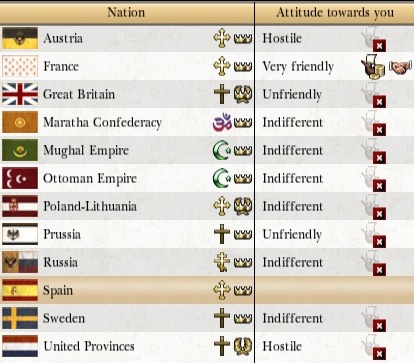
Ist Österreich unter Druck, hat man sich der einen feindlich gesinnten Supermacht entledigt und Preußen muss sich das weitere Vorgehen gut überlegen, sonst geraten so manche der östlichen Gebiete unter Fremdherrschaft. Russland scheidet schon allein deshalb als Bündnispartner aus, weil es zu lange brauchen würde, um Österreich und Preußen zu bedrohen, außerdem ist da Krim-Protektorat der Osmanen ein möglicher Streitigkeitsgrund der die Allianz nur unnötig belasten könnte.
Portugal
Mit französischer Hilfe sollte man auch versuchen Portugal möglichst bald auszuschalten, da es ebenso wie die Niederlande Kolonien in Indien, sowie einen Handelsplatz in Brasilien besetzt hält. Die Besatzung Lissabons wird jedoch in Südamerika die Gründung Kolumbiens nach sich ziehen, das allerdings nicht automatisch die diplomatischen Beziehungen des einstigen Mutterlandes erbt und vorerst in Frieden gelassen werden kann.
Savoyen
Ist als möglicher Bündnispartner Österreichs und Störfaktor in Norditalien das nach den Niederlanden wichtigste Ziel, wenn man Portugal vorerst außer Acht lässt. Die Vernichtung dieses Landes hat Priorität und ist notwendig um eine mögliche Front gegen Österreich vorzubereiten, dass die Ostalliierten zügeln sollten. Spanien hat dank der Niederlassungen in Sizilien, Mailand und Sardinien einen gewissen Startvorteil, was man nützen sollte, um eine Seeblockade und konstante Angriffszüge durchzuführen. Zeitgleich ist es notwendig dass französische Truppen, die vielleicht zuerst bei der Besatzung Portugals eingesetzt wurden und nun im Mittelmeer angelangt sind, an die westliche Front/Grenze verlegt werden. Auch Savoyen ist ein wichtiger Militärstützpunkt, besonders zur Eroberung Norditaliens und dem Angriff auf Österreich.
England
Da Großbritannien sehr stark von seinen Kolonien abhängig ist und die größten davon nur Protektorate sind, sollte man gemeinsam zunächst eine Seeblockade starten und in den Niederlanden eine Invasionsstreitmacht vorbereiten. Diese wird jedoch primär dazu dienen die Provinzen zu verwüsten und so Irland und Schottland zur Revolution zu bewegen. Danach kann London besetzt werden und es gilt zu versuchen, die 13 Kolonien in ein neues Bündnis einzubinden.
Indien
In Indien sollte man die Marathen unterstützen, welche sich Goa und Ceylon aneignen könnten und die Moguln zurückdrängen, mit der Sicherheit dass keine Kolonialtruppen in ihren Rücken fallen. Indien ist eines der Primärziele für die Allianz, jedoch sollte man zuerst die Handelszonen requirieren und etwa Mysore besetzen, während man den Moguln Provinzen abnimmt.
Amerika
Hier gibt es wenig Provinzen, jedoch viele Protektorate die nach Unabhängigkeit streben werden und dabei wertvolle Ressourcen besitzen. Nach einer Absicherung der Grenzen in Europa und Entsendung von Handelsflotten in die Handelszonen, wird Amerika zum Schauplatz eines großen Krieges gegen Indianer, feindliche Kolonialparteien und die 13 Kolonien werden.
Andere mögen die Chance in Empire kooperativ zu zocken kreativ nutzen, diejenigen die nach einer möglichst todsicheren Allianz suchen, können jedoch leicht drauf verzichten und dennoch eine herausfordernde Schlachten erleben.
Spaniens Stellung ist zu anfang sehr stark, das muss so bleiben, es ist also notwendig sich an folgende 3 Punkte zu halten und Frankreich kann nur davon profitieren.
Aggression-Elimination
Als Antwort auf die Kriegserklärungen müssen Portugal, Savoyen und Niederlande ausgeschaltet werden. Portugal sollte Ziel einer französischen Flotte mit Truppen werden, Verstärkung kommt von spanischen Hilfstruppen. Savoyen sollte französisch werden, Truppen von Spanisch-Mailand, Italien und Frankreich. Die Niederlande müssen vollständig spanisch werden, französische Truppen aus dem Elsass. Friedensverhandlungen.
Damit sind 2 Kolonialmächte ausgeschaltet, sowie 2 Rivalen um die Vorherrschaft im Mittelmeer und insgesamt 3 potentiell aufstrebende Gegner an den Flanken.
Konsolidierung-Aufrüstung
Gebiete aufteilen (die ehemals portugiesichen Kolonien und eventuell besetzte Länder in Deutschland und Italien), Militärstützpunkte errichten (vor allem den Niederlanden um Deutschland niederzuhalten, sowie in Norditalien um Österreich an der Südflanke in Schach zu halten und das Mittelmeer unter Kontrolle zu bringen)
Expansion!
Nach Etablierung einer starken Militärmacht, können die restlichen Staaten kassiert werden. Bis dahin sollte man darauf achten, dass die Länder alle möglichst klein bleiben und eventuell Bündnisse mit anderen Großmächten schmieden. Es wäre auch möglich, die Allianz ruhen zu lassen, um so ein gegen die Allianz vereintes Europa zu verhindern.
Variante 2
NiederlandeAls erstes Angriffsziel müssen die Niederlande besiegt werden. Dazu müssen Truppen aus Flandern und dem Elsass zuschlagen. Damit werden die niederländischen Kolonien frei. Die Region "Großholland" sollte in einen Militärstützpunkt umgewandelt werden, dieser liegt nahe an Großbritannien und Deutschland, kann also einschüchternde Wirkung entfalten. Zugleich können die Main Territories wie Spanien oder Frankreich zu den ultiamtiven Wirtschaftszentren umgeformt werden und Militärbauten an die Randterritorien ausgelagert werden.
Bündnisse
Sollte man mit Polen und dem Osmanischen Reich schließen, denn Österreich wird einem schnell den Krieg erklären. Mit den Osmanen an der Südflanke und den Polen im Osten kann man Österreich stark unter Druck setzen und zugleich dank Polen auch Preußen bekämpfen, dass sich Österreich anschließen könnte. Die Anfangskonstellation ist nämlichlaut einem Screenshot von Spanien um 1700 folgende:

Ist Österreich unter Druck, hat man sich der einen feindlich gesinnten Supermacht entledigt und Preußen muss sich das weitere Vorgehen gut überlegen, sonst geraten so manche der östlichen Gebiete unter Fremdherrschaft. Russland scheidet schon allein deshalb als Bündnispartner aus, weil es zu lange brauchen würde, um Österreich und Preußen zu bedrohen, außerdem ist da Krim-Protektorat der Osmanen ein möglicher Streitigkeitsgrund der die Allianz nur unnötig belasten könnte.
Portugal
Mit französischer Hilfe sollte man auch versuchen Portugal möglichst bald auszuschalten, da es ebenso wie die Niederlande Kolonien in Indien, sowie einen Handelsplatz in Brasilien besetzt hält. Die Besatzung Lissabons wird jedoch in Südamerika die Gründung Kolumbiens nach sich ziehen, das allerdings nicht automatisch die diplomatischen Beziehungen des einstigen Mutterlandes erbt und vorerst in Frieden gelassen werden kann.
Savoyen
Ist als möglicher Bündnispartner Österreichs und Störfaktor in Norditalien das nach den Niederlanden wichtigste Ziel, wenn man Portugal vorerst außer Acht lässt. Die Vernichtung dieses Landes hat Priorität und ist notwendig um eine mögliche Front gegen Österreich vorzubereiten, dass die Ostalliierten zügeln sollten. Spanien hat dank der Niederlassungen in Sizilien, Mailand und Sardinien einen gewissen Startvorteil, was man nützen sollte, um eine Seeblockade und konstante Angriffszüge durchzuführen. Zeitgleich ist es notwendig dass französische Truppen, die vielleicht zuerst bei der Besatzung Portugals eingesetzt wurden und nun im Mittelmeer angelangt sind, an die westliche Front/Grenze verlegt werden. Auch Savoyen ist ein wichtiger Militärstützpunkt, besonders zur Eroberung Norditaliens und dem Angriff auf Österreich.
England
Da Großbritannien sehr stark von seinen Kolonien abhängig ist und die größten davon nur Protektorate sind, sollte man gemeinsam zunächst eine Seeblockade starten und in den Niederlanden eine Invasionsstreitmacht vorbereiten. Diese wird jedoch primär dazu dienen die Provinzen zu verwüsten und so Irland und Schottland zur Revolution zu bewegen. Danach kann London besetzt werden und es gilt zu versuchen, die 13 Kolonien in ein neues Bündnis einzubinden.
Indien
In Indien sollte man die Marathen unterstützen, welche sich Goa und Ceylon aneignen könnten und die Moguln zurückdrängen, mit der Sicherheit dass keine Kolonialtruppen in ihren Rücken fallen. Indien ist eines der Primärziele für die Allianz, jedoch sollte man zuerst die Handelszonen requirieren und etwa Mysore besetzen, während man den Moguln Provinzen abnimmt.
Amerika
Hier gibt es wenig Provinzen, jedoch viele Protektorate die nach Unabhängigkeit streben werden und dabei wertvolle Ressourcen besitzen. Nach einer Absicherung der Grenzen in Europa und Entsendung von Handelsflotten in die Handelszonen, wird Amerika zum Schauplatz eines großen Krieges gegen Indianer, feindliche Kolonialparteien und die 13 Kolonien werden.
Permalink (4 Kommentare) Kommentieren
Montag, 9. Februar 2009
Empire: Total War - Die Fraktionsbeschreibungen
Am Montag, 9. Feb 2009 im Topic 'Empire'
Hier haben wir sie, die Original-Fraktionsbeschreibungen:
Frankreich
Großbritannien
Maratha
Niederlande
Österreich
Osmanisches Reich
Polen-Litauen
Preußen
Russland
Schweden
Spanien
USA
Frankreich
Großbritannien
Maratha
Niederlande
Österreich
Osmanisches Reich
Polen-Litauen
Preußen
Russland
Schweden
Spanien
USA
Empire: Total War - Die Karte in Screenshots
Am Montag, 9. Feb 2009 im Topic 'Empire'
Um 1700 beginnt das Spiel und Europa sieht ungefähr so aus, wie auf den historischen Karten
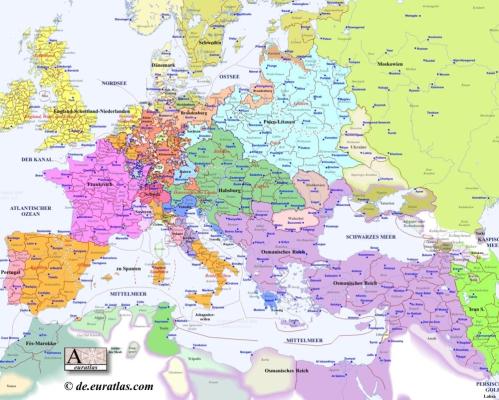
Die Macht liegt jedoch in den Provinzen, diese sind nämlich unterschiedlich wertvoll und so siegt nicht zwangsläufig der mit den meisten Hauptstädten, sondern den wertvollsten Ressourcenquellen und besten Industriezentren. Frankreich etwa besteht aus einer einzigen Region, diese hat in Paris die Hauptstadt und ist ungleich stärker als manch kleinerer Nachbar.
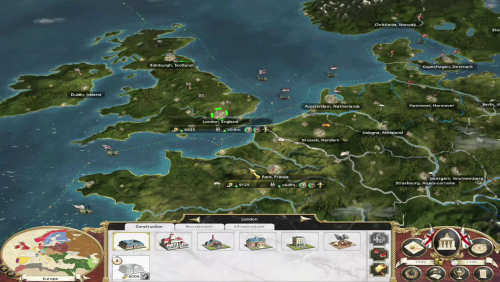
Hier zu sehen, Südeuropa. Das Besondere, die Hauptstädte haben diese kleinen griechischen Symbole beim Namen, man kann sie so genau erkennen. Der Kirchenstaat wird diesmal keine große Rolle mehr spielen, existiert aber als Stadtstaat noch. Die Schweiz ist scheinbar nicht dabei, dafür hat aber Genau Korsika behalten und man sieht einige der deutschen Stadtstaaten wie Bayern, Württemberg, Sachsen oder Hannover.
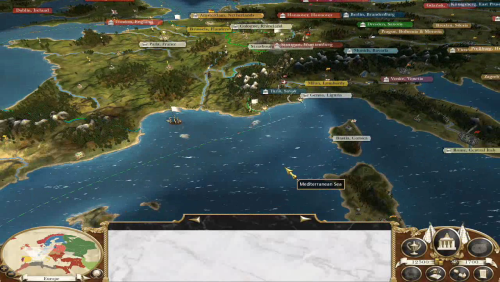
Sorry dass die Auflösung so mies ist, doch hier sieht man Griechenland und den Balkan. Sehr gut zu erkennen, die osmanische Vorherrschaft bis an die Südgrenze von Österreich und sogar Kiew, dass wohl unter russischer Herrschaft steht. Morea, im Süden Griechenlands, steht zu diesem Zeitpunkt noch unter venezianischer Kontrolle und im Spielverlauf wird der Balkan zu einem der größten Schlachtfelder von Russen, Österreichern, Venezianern und Osmanen.

Zoom auf den Nahen Osten. Viel sieht man nicht gerade, aber die Provinzen dürfen klein bleiben, da sie ansonsten nicht sehr wertvoll wären und die Macht der Osmanen liegt ohnehin darin, dass sie sehr viele Provinzen besitzen.
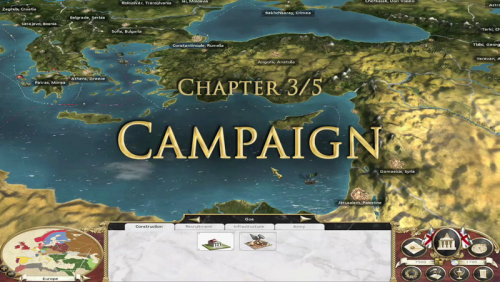
Solche Karten machen Freude, Kuba mit Havanna, das britische Port Royale, Nassau und Santo Domingo als Vorposten der Neuen Welt. Nassau könnte je nachdem entweder britisch oder eine Piratenstadt sein.
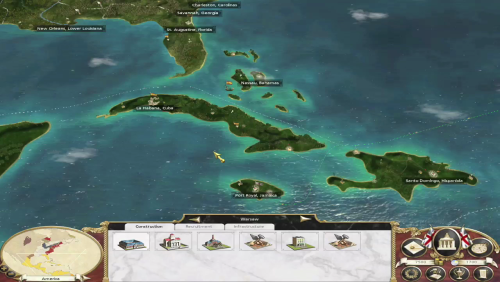
Eine Detailansicht Noramderikas um 1783, als die 13 Kolonien gerade die Unabhängigkeit erkämpft hatten. Zu sehen, über Philadelphia eine Indianer-Provinz, sowie die Reste des britischen Empire in Quebec und Montreal.
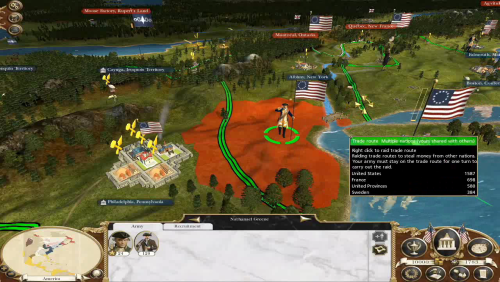
Das südliche Ostküsten-Nordamerika mit Louisiane und Florida, bekannt aus dem Campaign-Trailer. Louisiane ist noch französisch, Florida spanisch.
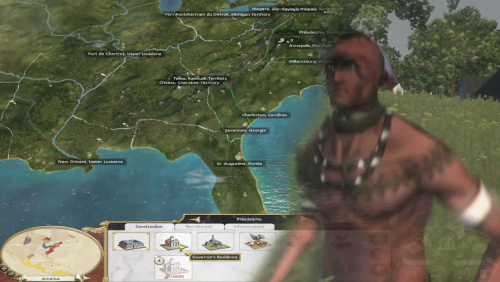
Die Ostküste im Detail:
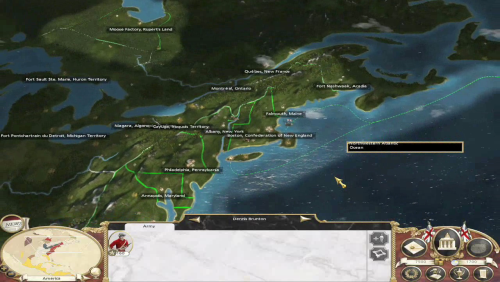
Mexiko
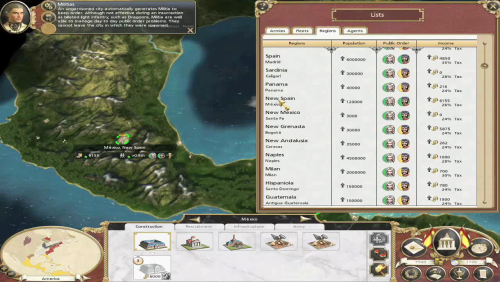
Indien im Westen
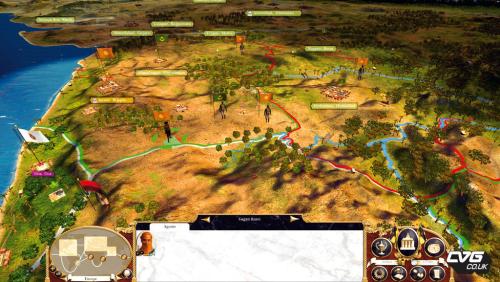
Indien in der Übersicht

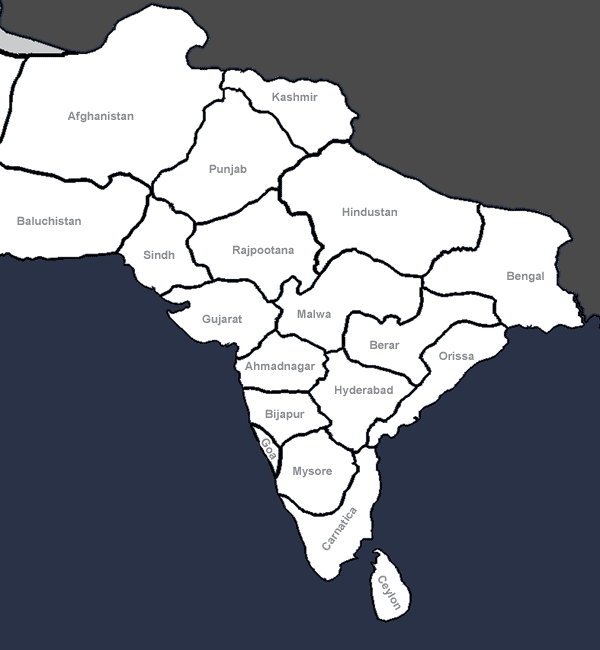

Die Macht liegt jedoch in den Provinzen, diese sind nämlich unterschiedlich wertvoll und so siegt nicht zwangsläufig der mit den meisten Hauptstädten, sondern den wertvollsten Ressourcenquellen und besten Industriezentren. Frankreich etwa besteht aus einer einzigen Region, diese hat in Paris die Hauptstadt und ist ungleich stärker als manch kleinerer Nachbar.

Hier zu sehen, Südeuropa. Das Besondere, die Hauptstädte haben diese kleinen griechischen Symbole beim Namen, man kann sie so genau erkennen. Der Kirchenstaat wird diesmal keine große Rolle mehr spielen, existiert aber als Stadtstaat noch. Die Schweiz ist scheinbar nicht dabei, dafür hat aber Genau Korsika behalten und man sieht einige der deutschen Stadtstaaten wie Bayern, Württemberg, Sachsen oder Hannover.

Sorry dass die Auflösung so mies ist, doch hier sieht man Griechenland und den Balkan. Sehr gut zu erkennen, die osmanische Vorherrschaft bis an die Südgrenze von Österreich und sogar Kiew, dass wohl unter russischer Herrschaft steht. Morea, im Süden Griechenlands, steht zu diesem Zeitpunkt noch unter venezianischer Kontrolle und im Spielverlauf wird der Balkan zu einem der größten Schlachtfelder von Russen, Österreichern, Venezianern und Osmanen.

Zoom auf den Nahen Osten. Viel sieht man nicht gerade, aber die Provinzen dürfen klein bleiben, da sie ansonsten nicht sehr wertvoll wären und die Macht der Osmanen liegt ohnehin darin, dass sie sehr viele Provinzen besitzen.

Solche Karten machen Freude, Kuba mit Havanna, das britische Port Royale, Nassau und Santo Domingo als Vorposten der Neuen Welt. Nassau könnte je nachdem entweder britisch oder eine Piratenstadt sein.

Eine Detailansicht Noramderikas um 1783, als die 13 Kolonien gerade die Unabhängigkeit erkämpft hatten. Zu sehen, über Philadelphia eine Indianer-Provinz, sowie die Reste des britischen Empire in Quebec und Montreal.

Das südliche Ostküsten-Nordamerika mit Louisiane und Florida, bekannt aus dem Campaign-Trailer. Louisiane ist noch französisch, Florida spanisch.

Die Ostküste im Detail:

Mexiko

Indien im Westen

Indien in der Übersicht


Permalink (0 Kommentare) Kommentieren
... ältere Einträge
